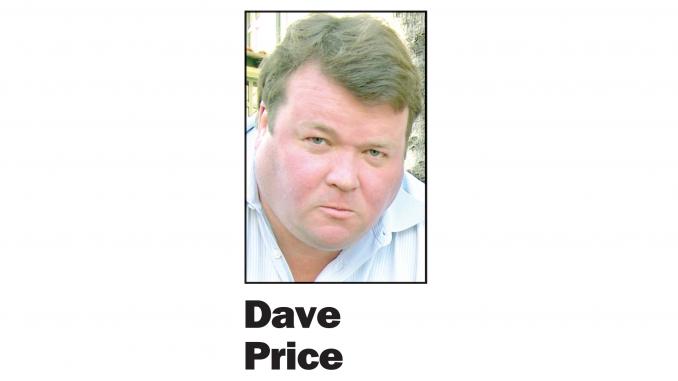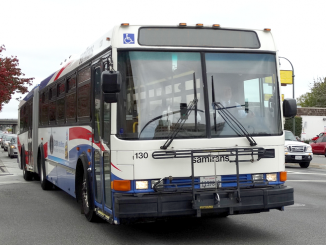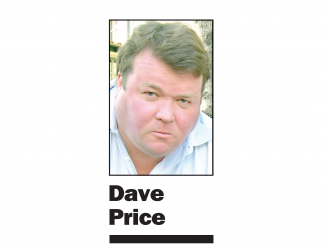
OPINION
BY DAVE PRICE
Daily Post Editor
Could the tax-raisers give the rest of us a break? The San Mateo County Supervisors are moving ahead with plans to put a half-cent sales tax on next November’s ballot to raise money for transportation projects.
It was little over a year ago when voters approved the supervisor’s last tax proposal, Measure K, an extension of a half-cent “temporary” sales tax.
In that election, Belmont and East Palo Alto raised their sales taxes too.
Next year, voters in San Mateo County will be facing at least three measures designed to take cash out of their pockets. Besides the half-cent transportation sales tax, Caltrain wants an eighth-of-a-cent sales tax in San Mateo, Santa Clara and San Francisco counties. It hasn’t been decided if that will be on the June or November ballots. And a $3 toll increase on the state-owned Bay bridges will go to voters in June.
These ballot measure descriptions are always written the same way. They tout the alleged benefits and downplay the cost. Low-information voters who aren’t paying attention approve them, diluting the votes of informed residents.
What’s sad about the constant push to raise sales taxes and tolls is that they hurt the very people our politicians claim to want to help — the poor and middle class. The wealthy spend a smaller percentage of their income on items that are subject to the sales tax than those who aren’t as well off. Local Progressives who favor such taxes should call themselves “the Regressives.”
There’s no doubt that the promoters of this new sales tax will promise that the money will reduce traffic congestion.
Analyze past performance
But when you hear that, ask yourself this question: What did we get from the current half-cent sales tax for transportation that’s been in effect for 29 years. I’m talking about Measure A of 1988, which was renewed in 2004?
Has Measure A made it easier to get around? Did Measure A reduce congestion?
How much did Measure A increase our freeway capacity?
And the San Mateo County Board of Supervisors isn’t even sure how they will spend these transportation tax dollars if this new tax is approved. They’re asking cities around the county to come up with wish lists of projects to fund. Menlo Park finalized its wish list last Tuesday.
This process is backward. First you determine what is needed, then you ask for the money.
Hidden room for more lanes
I think we’ve been on the wrong track when it comes to transportation funding. Too much money has been poured into mass transit, toll lanes, road diets and road obstructions euphemistically called “traffic calming,” and we’re not putting enough money into our highways.
It’s amazing the planners for Highway 101 in San Mateo County have suddenly found space on both sides of the road to add an extra lane on each side. They only did so because they wanted to add a toll lane. They could have added those lanes years ago, but now they want to in order to add a lane that most drivers won’t be able to use — just those who are permitted in carpool lanes or are willing to pay an electronic toll.
Why didn’t they trot out this extra lane years ago? Traffic has been terrible on 101 for a long time. But it apparently takes a pet project, like a toll lane, in order to widen a highway.
You may be asking yourself, “Isn’t there a limit to how high they can raise the sales tax?”
Yes, normally local governments (cities and counties) cannot collect more than 2% on every retail sales dollar. But legislation authored by Assemblyman Kevin Mullin, D-South San Francisco, and signed by Gov. Jerry Brown allows San Mateo County to go for a new half-cent sales tax and bust the 2% limit.
This 2% is just part of the overall sales tax. The total sales tax, when you include state levies, is 8.75% on average in San Mateo County, which is higher than the 7.25% the rest of the state pays on average. The rate in the city of San Mateo is 9% and it’s 9.25% in East Palo Alto, Belmont and South San Francisco.
Rising taxes
Next year, a lot of people will be thinking about taxes. The new tax bill that has won House and Senate approval will raise taxes for people in the Bay Area who will lose their deductions for state and local taxes.
Democrats like House Minority Leader Nancy Pelosi and Gov. Brown are upset about the bill because it will hurt their supporters.
But those who will be hit hardest by the loss of this deduction are the wealthy. Pelosi and Brown ought to come out just as ferociously against taxes that hit the middle- and lower-income brackets.
Editor Dave Price’s column appears on Mondays. His email address is price@padailypost.com.



